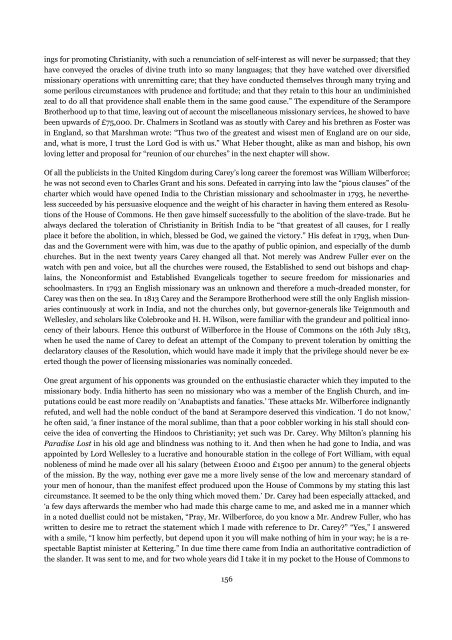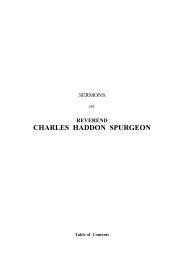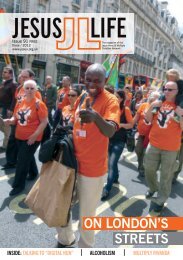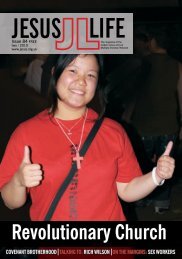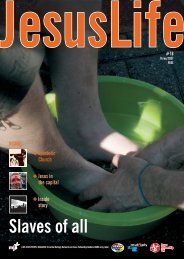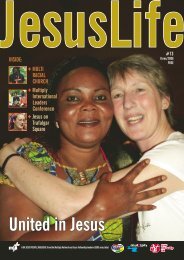Life of William Carey by George Smith - The Jesus Army
Life of William Carey by George Smith - The Jesus Army
Life of William Carey by George Smith - The Jesus Army
Create successful ePaper yourself
Turn your PDF publications into a flip-book with our unique Google optimized e-Paper software.
ings for promoting Christianity, with such a renunciation <strong>of</strong> self-interest as will never be surpassed; that they<br />
have conveyed the oracles <strong>of</strong> divine truth into so many languages; that they have watched over diversified<br />
missionary operations with unremitting care; that they have conducted themselves through many trying and<br />
some perilous circumstances with prudence and fortitude; and that they retain to this hour an undiminished<br />
zeal to do all that providence shall enable them in the same good cause.” <strong>The</strong> expenditure <strong>of</strong> the Serampore<br />
Brotherhood up to that time, leaving out <strong>of</strong> account the miscellaneous missionary services, he showed to have<br />
been upwards <strong>of</strong> £75,000. Dr. Chalmers in Scotland was as stoutly with <strong>Carey</strong> and his brethren as Foster was<br />
in England, so that Marshman wrote: “Thus two <strong>of</strong> the greatest and wisest men <strong>of</strong> England are on our side,<br />
and, what is more, I trust the Lord God is with us.” What Heber thought, alike as man and bishop, his own<br />
loving letter and proposal for “reunion <strong>of</strong> our churches” in the next chapter will show.<br />
Of all the publicists in the United Kingdom during <strong>Carey</strong>’s long career the foremost was <strong>William</strong> Wilberforce;<br />
he was not second even to Charles Grant and his sons. Defeated in carrying into law the “pious clauses” <strong>of</strong> the<br />
charter which would have opened India to the Christian missionary and schoolmaster in 1793, he nevertheless<br />
succeeded <strong>by</strong> his persuasive eloquence and the weight <strong>of</strong> his character in having them entered as Resolutions<br />
<strong>of</strong> the House <strong>of</strong> Commons. He then gave himself successfully to the abolition <strong>of</strong> the slave-trade. But he<br />
always declared the toleration <strong>of</strong> Christianity in British India to be “that greatest <strong>of</strong> all causes, for I really<br />
place it before the abolition, in which, blessed be God, we gained the victory.” His defeat in 1793, when Dundas<br />
and the Government were with him, was due to the apathy <strong>of</strong> public opinion, and especially <strong>of</strong> the dumb<br />
churches. But in the next twenty years <strong>Carey</strong> changed all that. Not merely was Andrew Fuller ever on the<br />
watch with pen and voice, but all the churches were roused, the Established to send out bishops and chaplains,<br />
the Nonconformist and Established Evangelicals together to secure freedom for missionaries and<br />
schoolmasters. In 1793 an English missionary was an unknown and therefore a much-dreaded monster, for<br />
<strong>Carey</strong> was then on the sea. In 1813 <strong>Carey</strong> and the Serampore Brotherhood were still the only English missionaries<br />
continuously at work in India, and not the churches only, but governor-generals like Teignmouth and<br />
Wellesley, and scholars like Colebrooke and H. H. Wilson, were familiar with the grandeur and political innocency<br />
<strong>of</strong> their labours. Hence this outburst <strong>of</strong> Wilberforce in the House <strong>of</strong> Commons on the 16th July 1813,<br />
when he used the name <strong>of</strong> <strong>Carey</strong> to defeat an attempt <strong>of</strong> the Company to prevent toleration <strong>by</strong> omitting the<br />
declaratory clauses <strong>of</strong> the Resolution, which would have made it imply that the privilege should never be exerted<br />
though the power <strong>of</strong> licensing missionaries was nominally conceded.<br />
One great argument <strong>of</strong> his opponents was grounded on the enthusiastic character which they imputed to the<br />
missionary body. India hitherto has seen no missionary who was a member <strong>of</strong> the English Church, and imputations<br />
could be cast more readily on ‘Anabaptists and fanatics.’ <strong>The</strong>se attacks Mr. Wilberforce indignantly<br />
refuted, and well had the noble conduct <strong>of</strong> the band at Serampore deserved this vindication. ‘I do not know,’<br />
he <strong>of</strong>ten said, ‘a finer instance <strong>of</strong> the moral sublime, than that a poor cobbler working in his stall should conceive<br />
the idea <strong>of</strong> converting the Hindoos to Christianity; yet such was Dr. <strong>Carey</strong>. Why Milton’s planning his<br />
Paradise Lost in his old age and blindness was nothing to it. And then when he had gone to India, and was<br />
appointed <strong>by</strong> Lord Wellesley to a lucrative and honourable station in the college <strong>of</strong> Fort <strong>William</strong>, with equal<br />
nobleness <strong>of</strong> mind he made over all his salary (between £1000 and £1500 per annum) to the general objects<br />
<strong>of</strong> the mission. By the way, nothing ever gave me a more lively sense <strong>of</strong> the low and mercenary standard <strong>of</strong><br />
your men <strong>of</strong> honour, than the manifest effect produced upon the House <strong>of</strong> Commons <strong>by</strong> my stating this last<br />
circumstance. It seemed to be the only thing which moved them.’ Dr. <strong>Carey</strong> had been especially attacked, and<br />
‘a few days afterwards the member who had made this charge came to me, and asked me in a manner which<br />
in a noted duellist could not be mistaken, “Pray, Mr. Wilberforce, do you know a Mr. Andrew Fuller, who has<br />
written to desire me to retract the statement which I made with reference to Dr. <strong>Carey</strong>?” “Yes,” I answered<br />
with a smile, “I know him perfectly, but depend upon it you will make nothing <strong>of</strong> him in your way; he is a respectable<br />
Baptist minister at Kettering.” In due time there came from India an authoritative contradiction <strong>of</strong><br />
the slander. It was sent to me, and for two whole years did I take it in my pocket to the House <strong>of</strong> Commons to<br />
156


